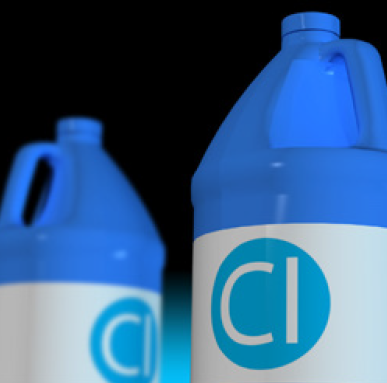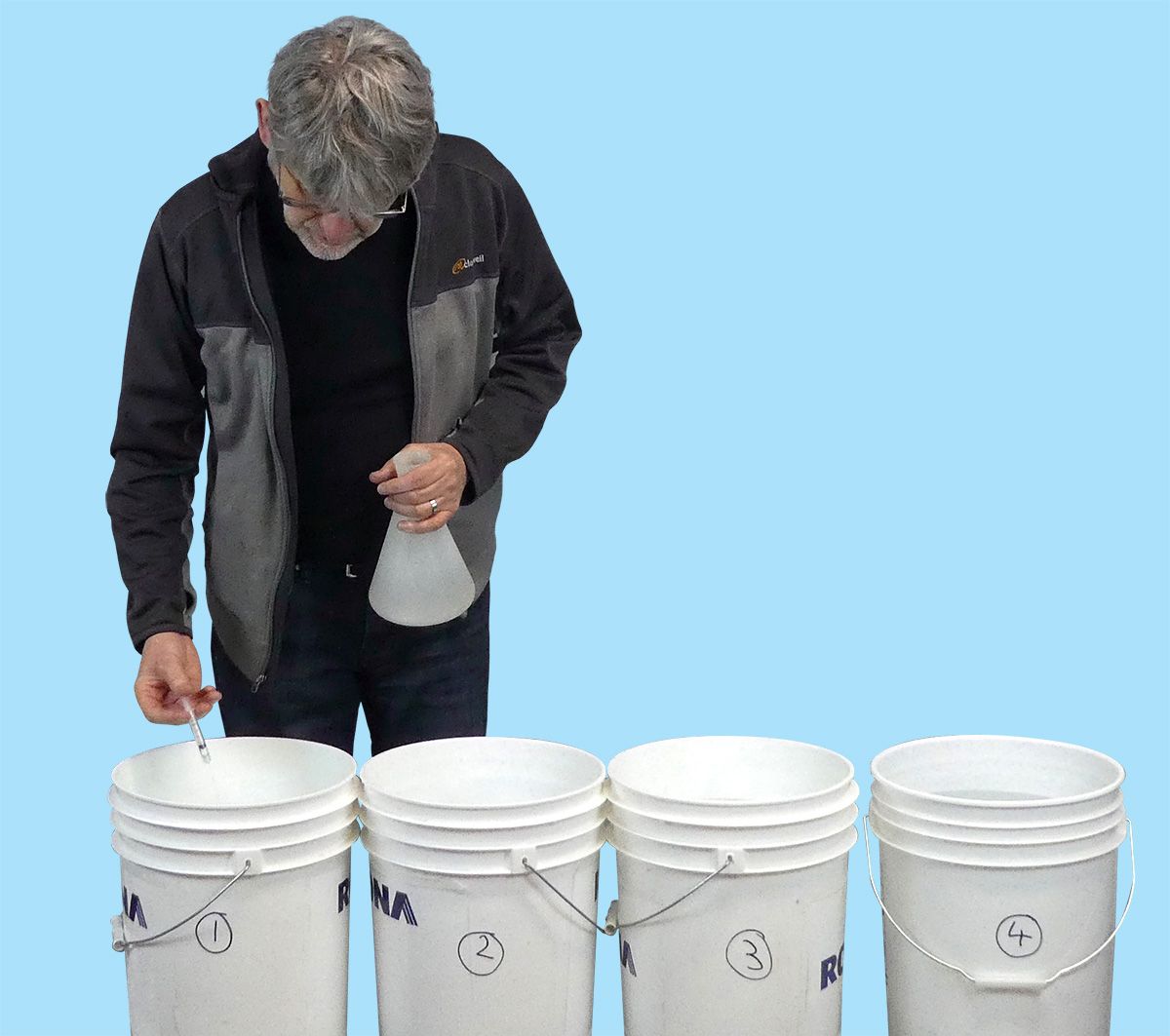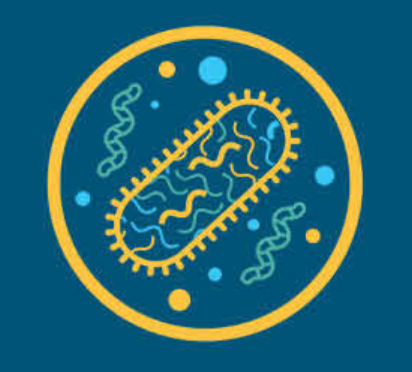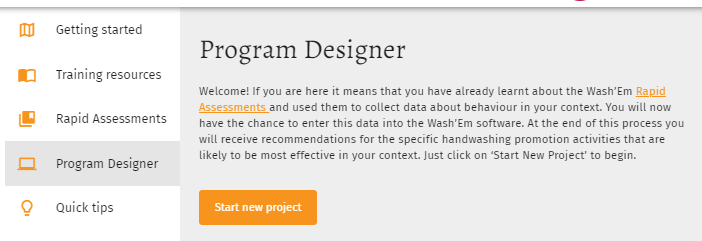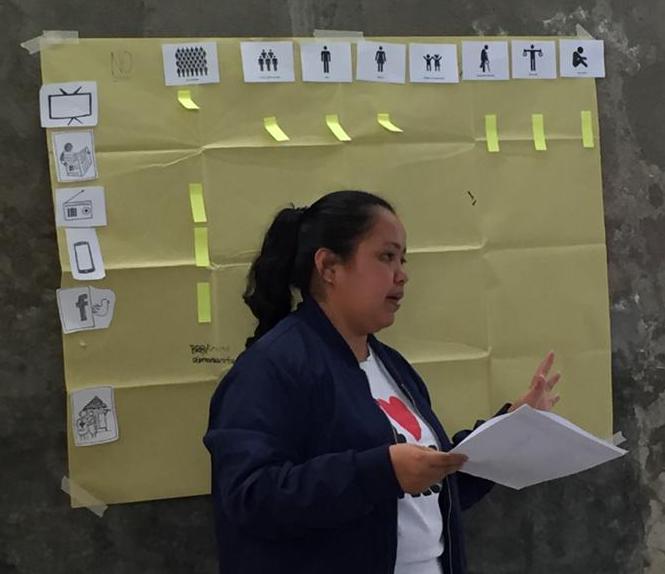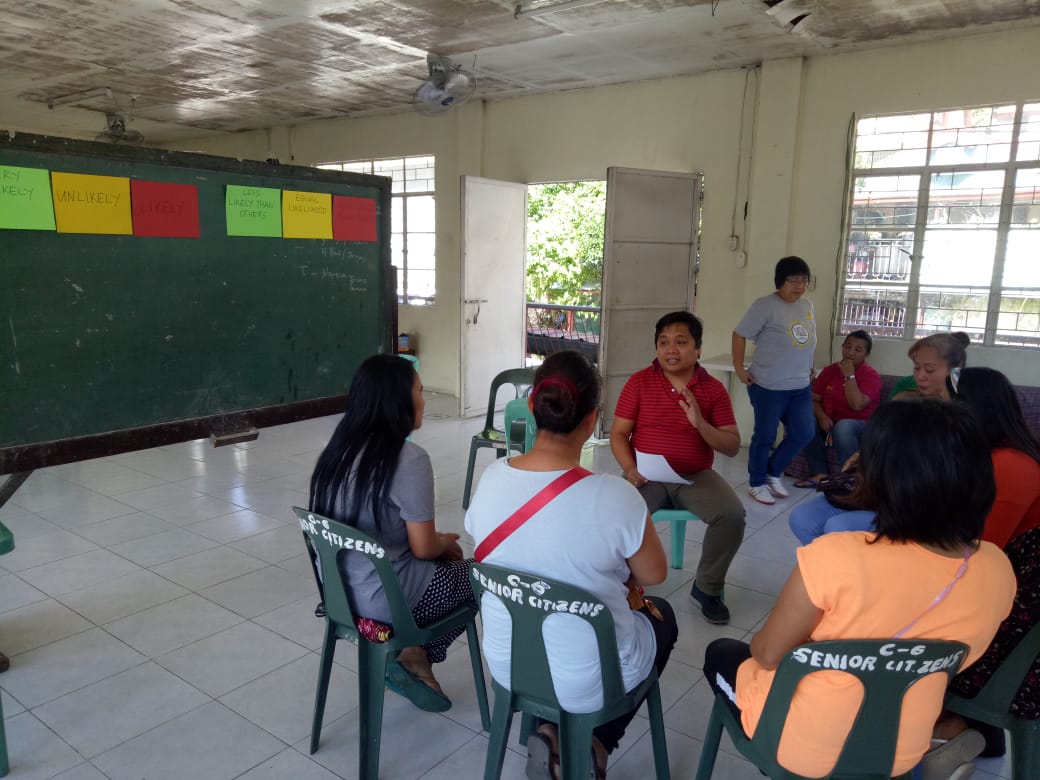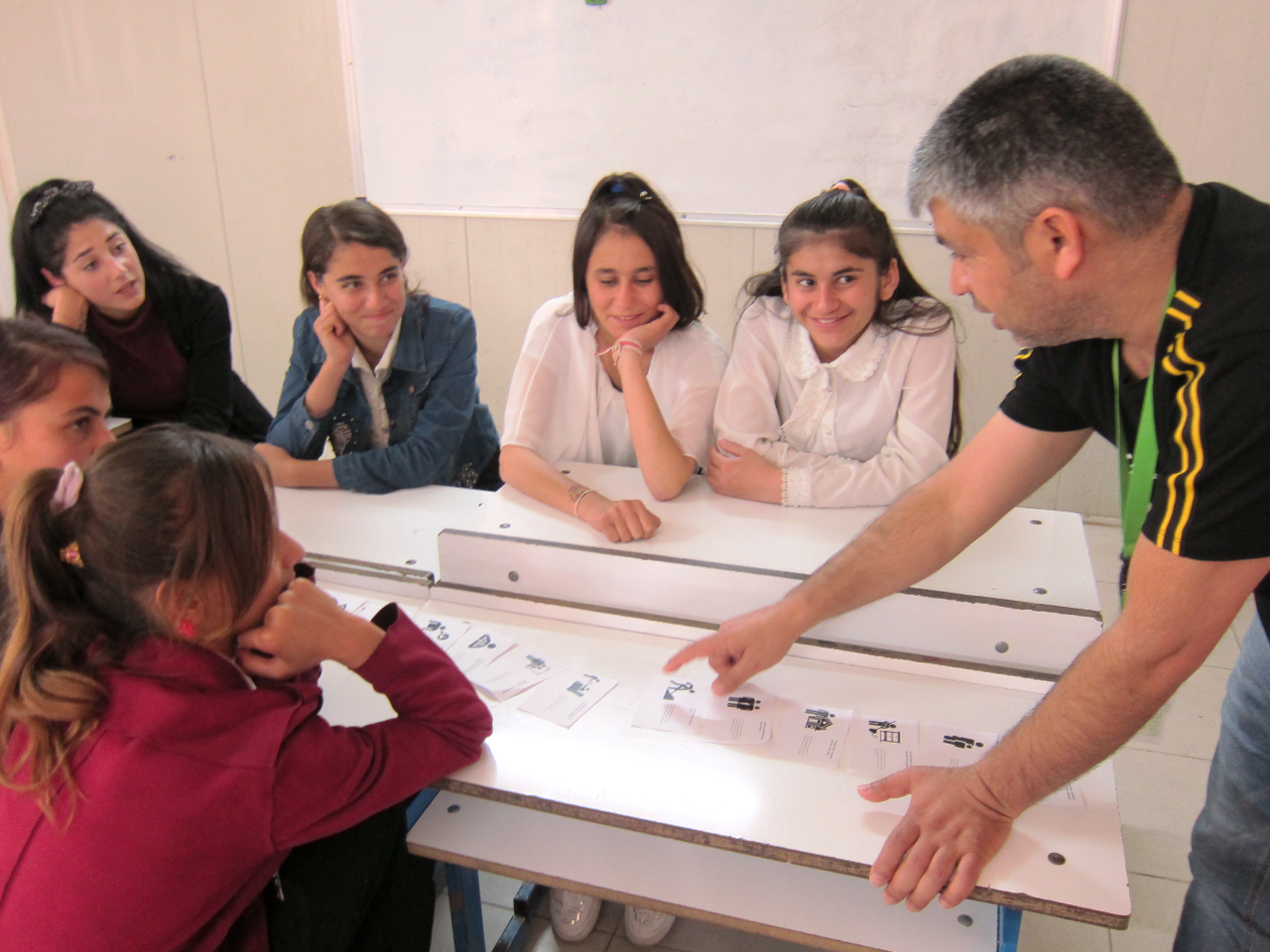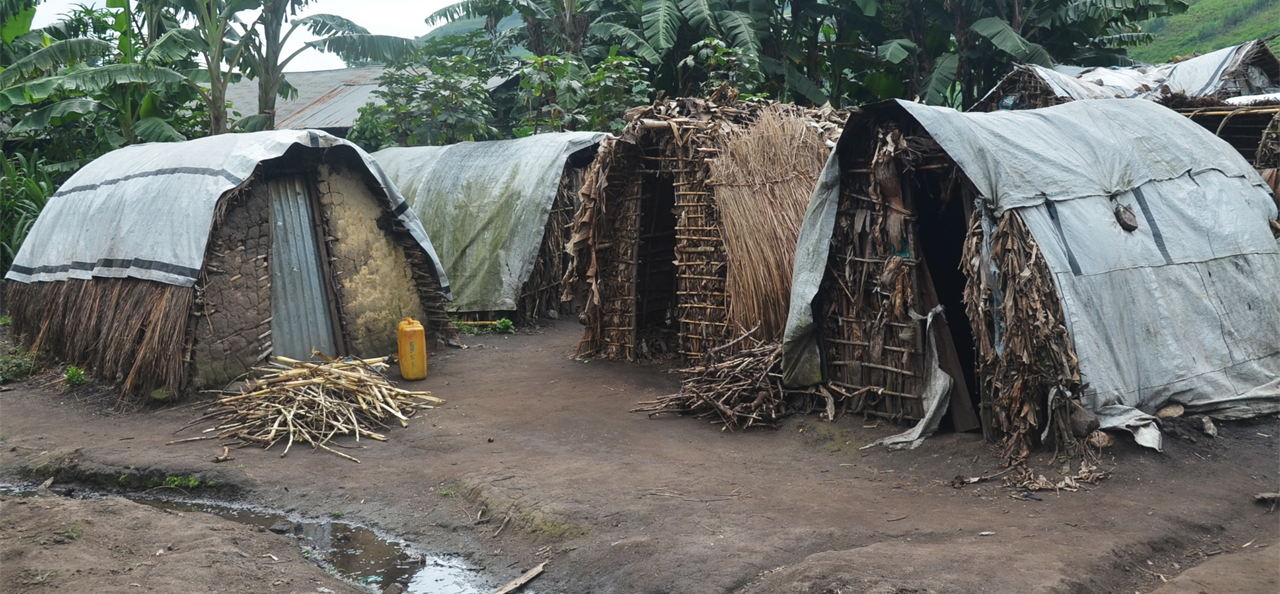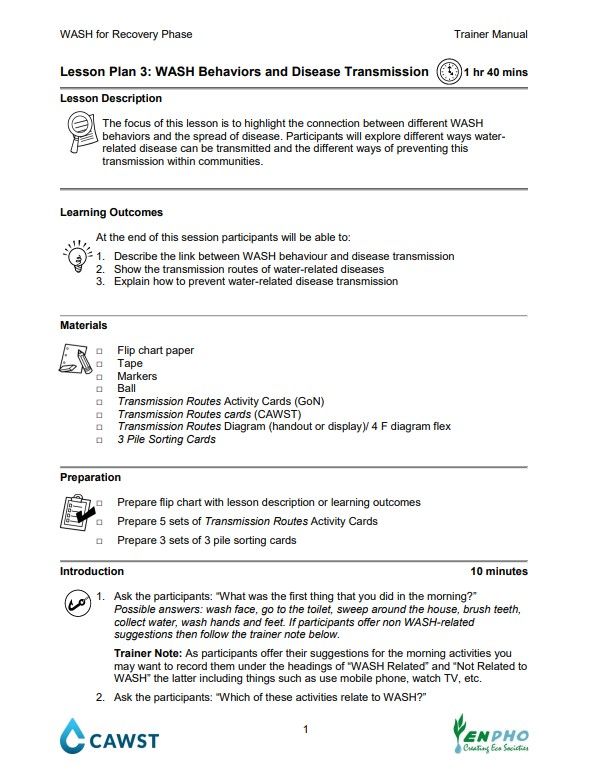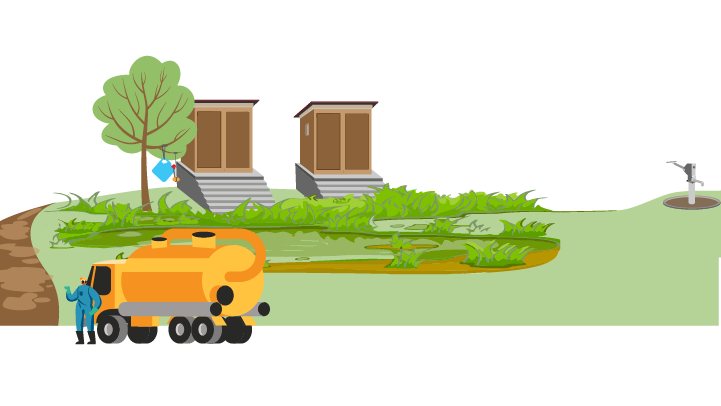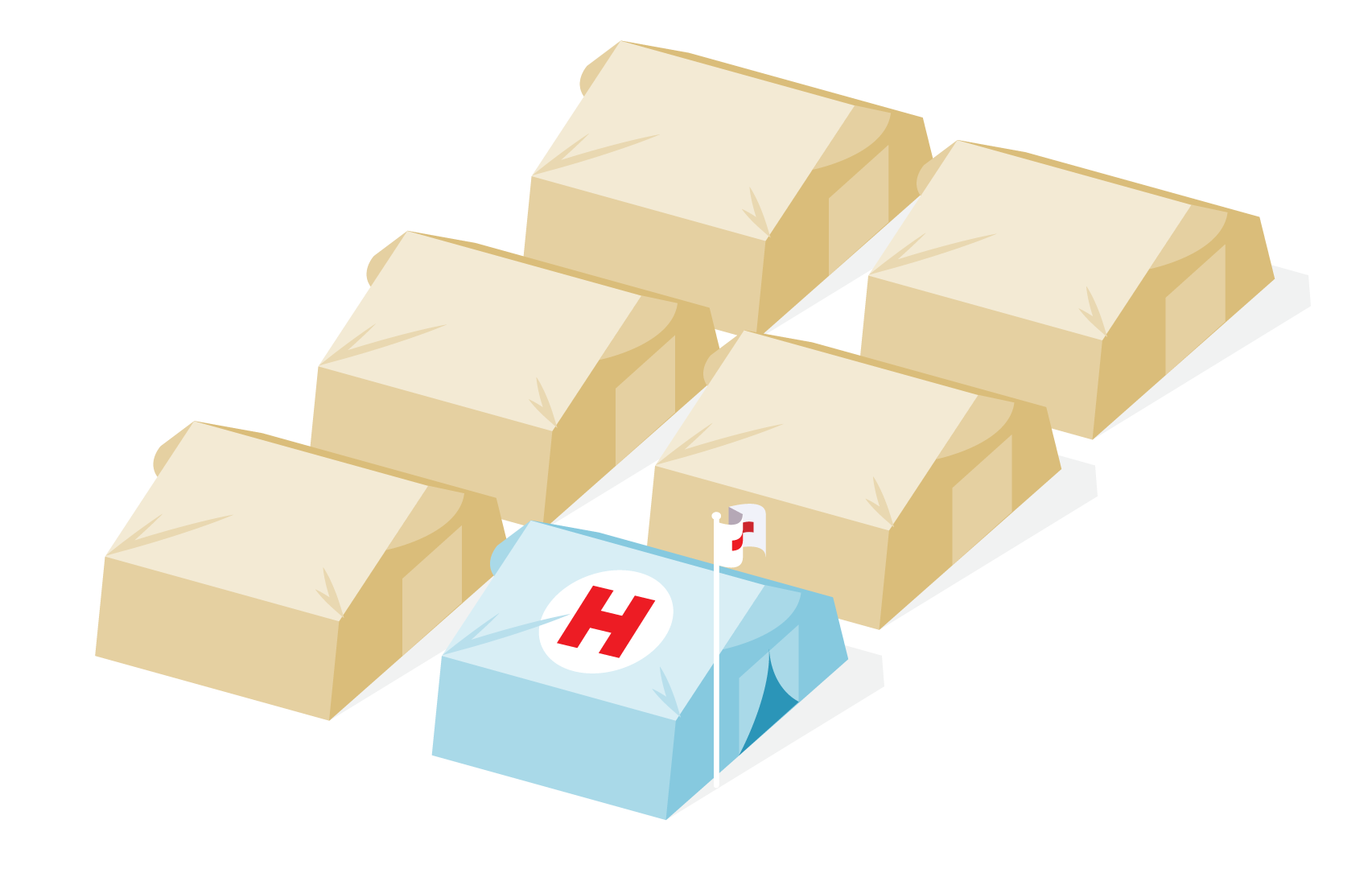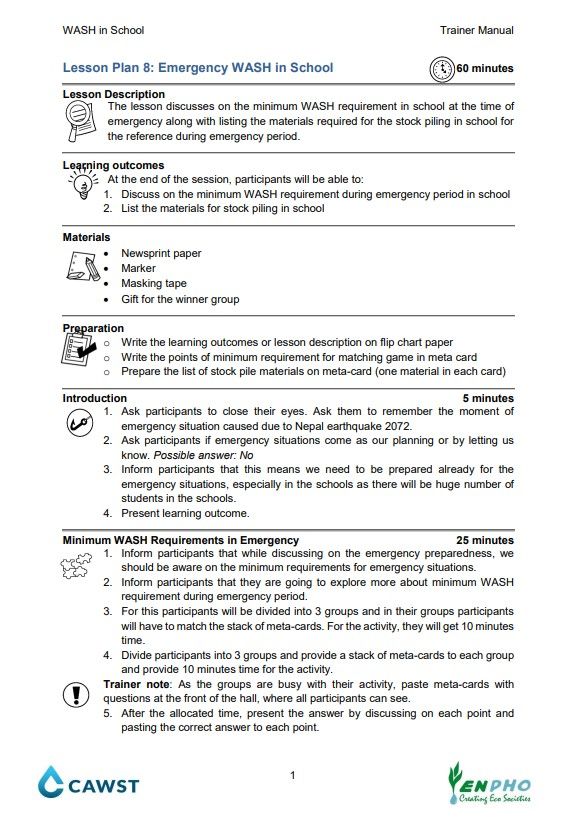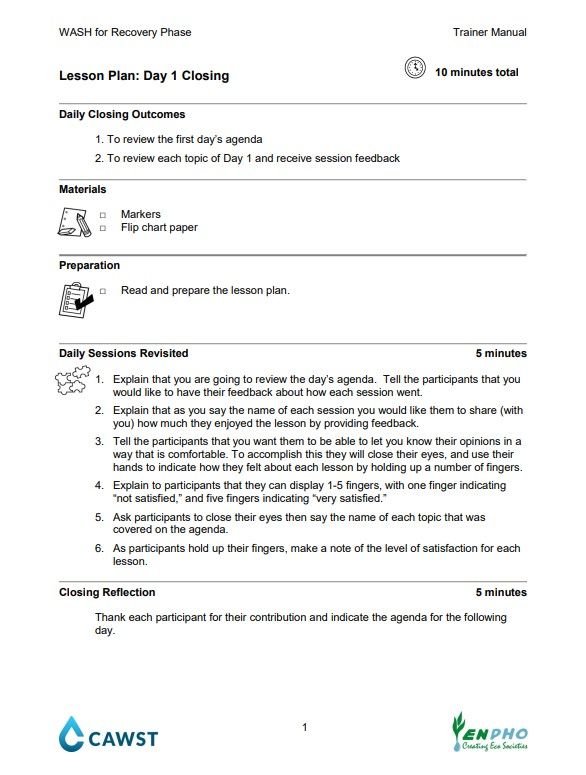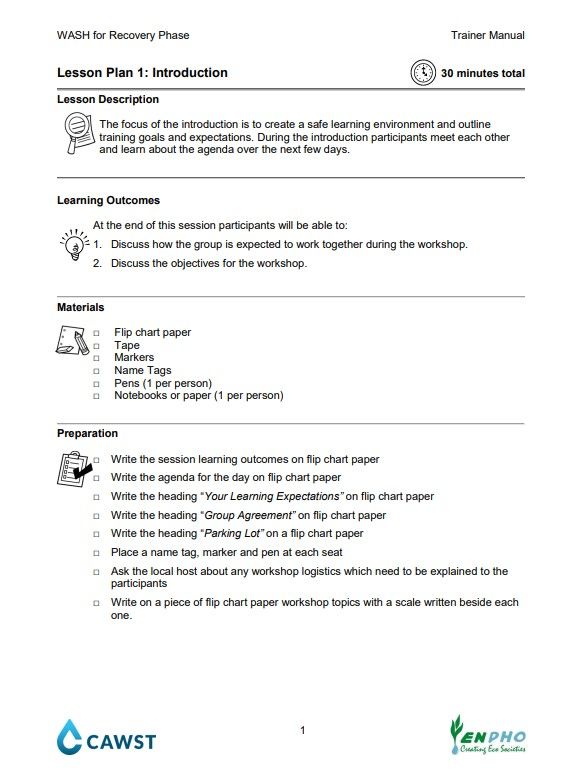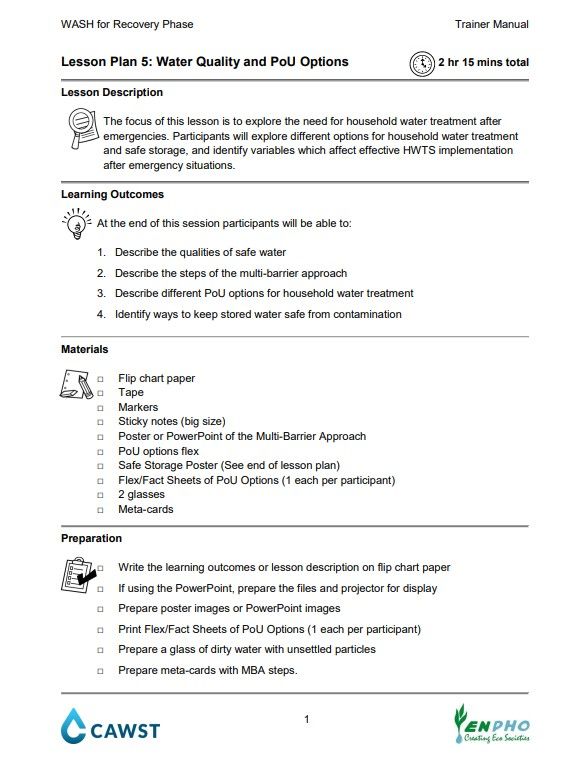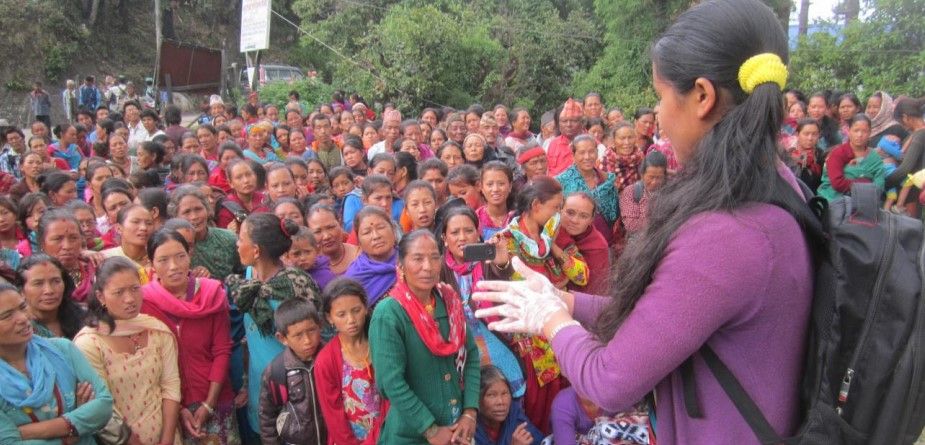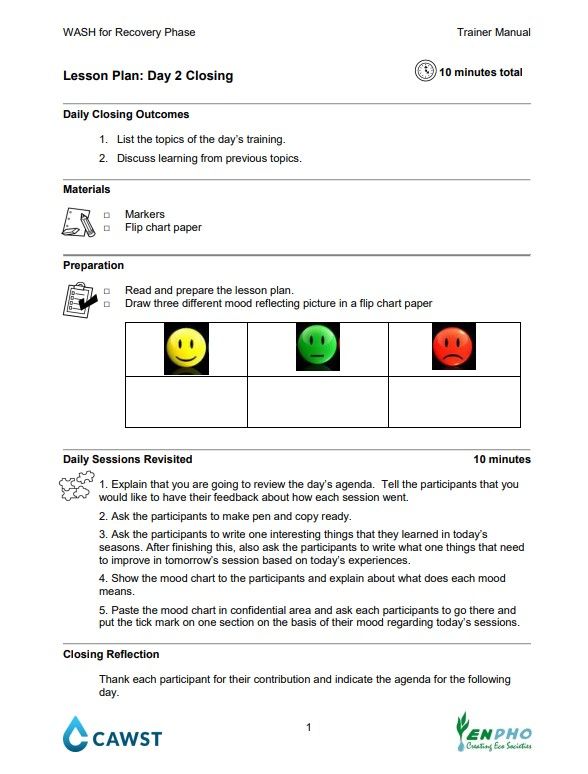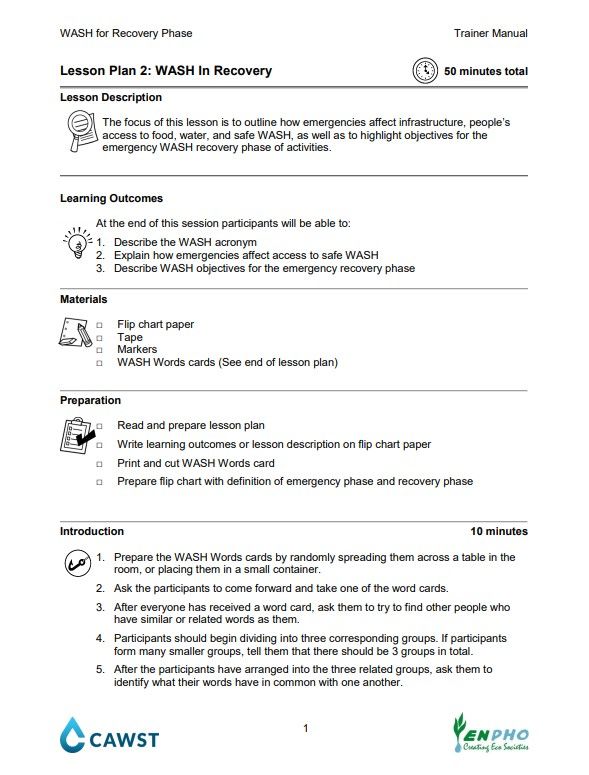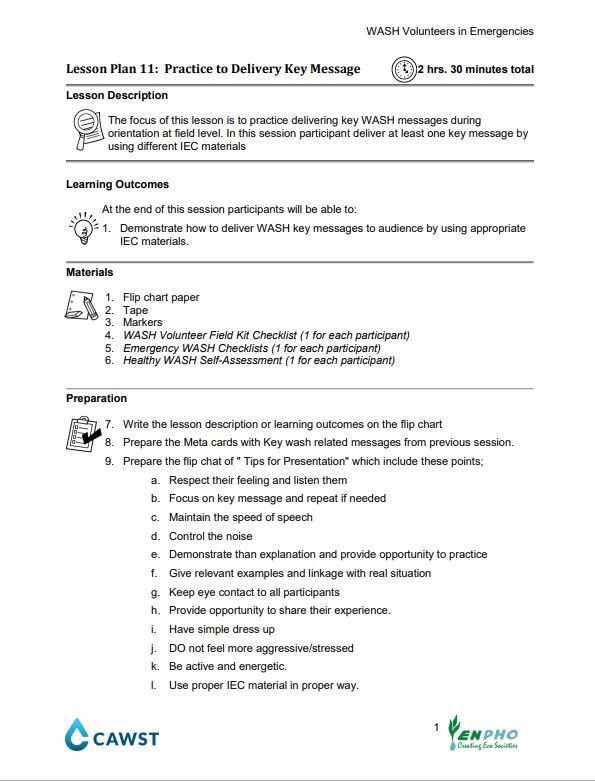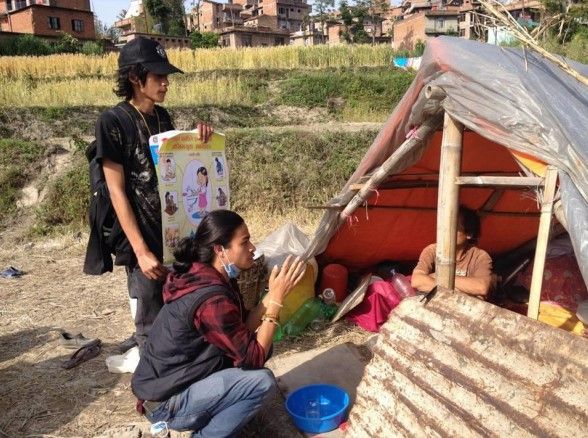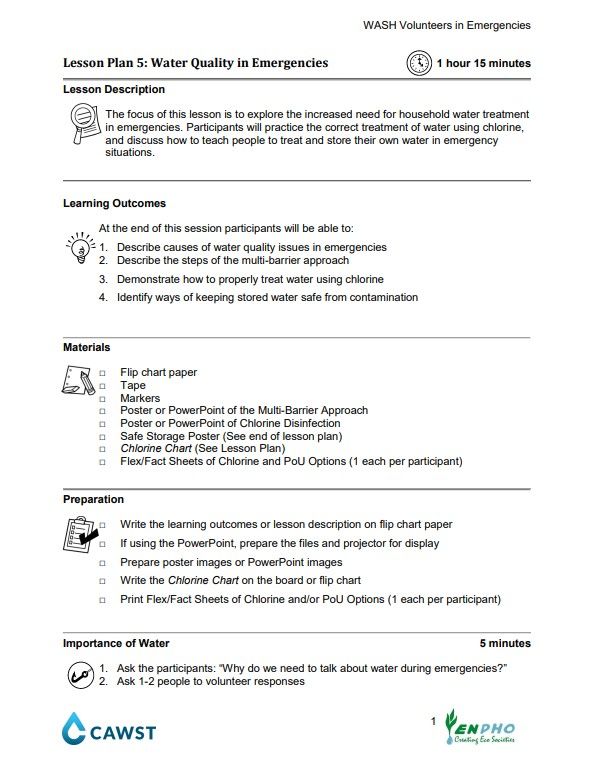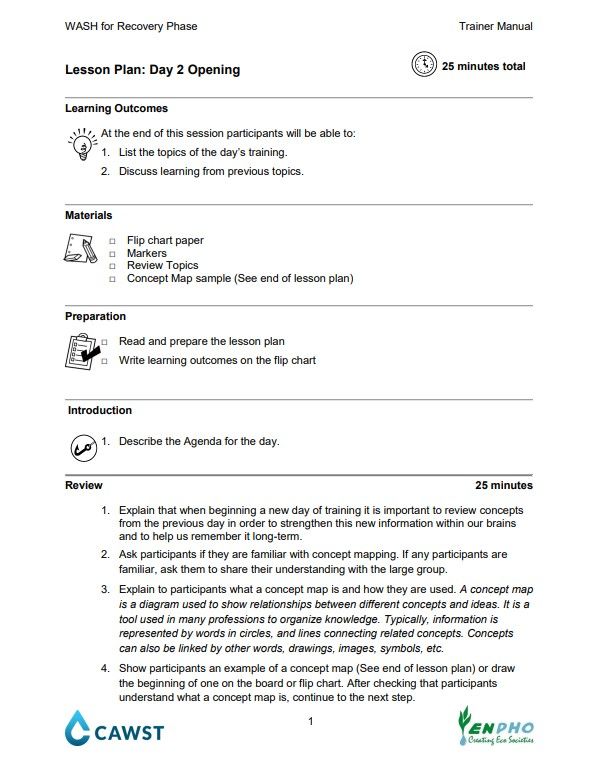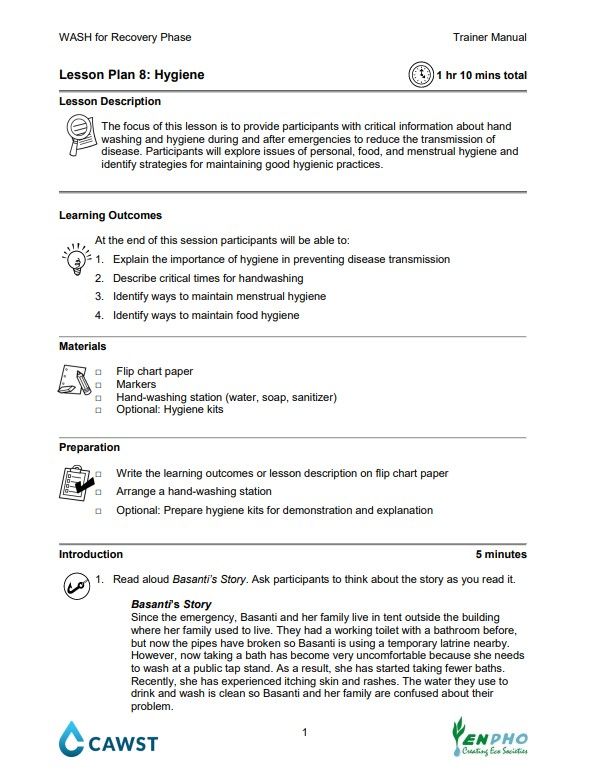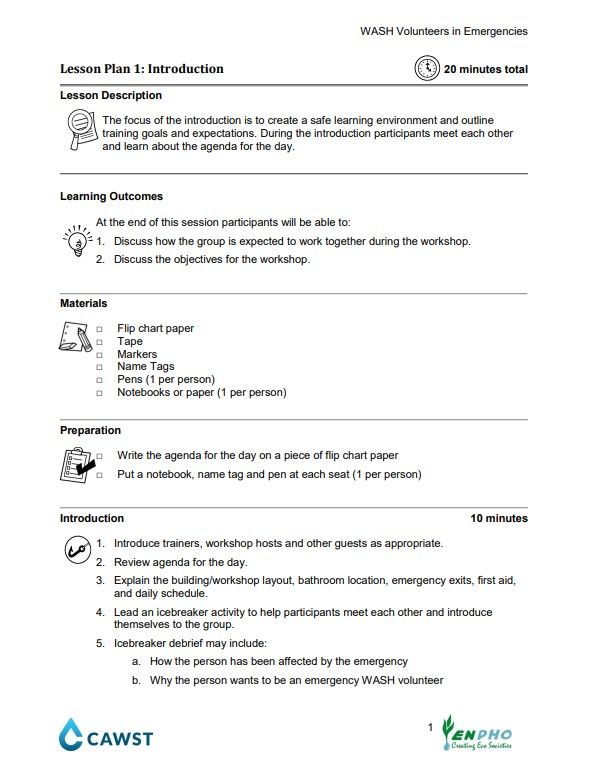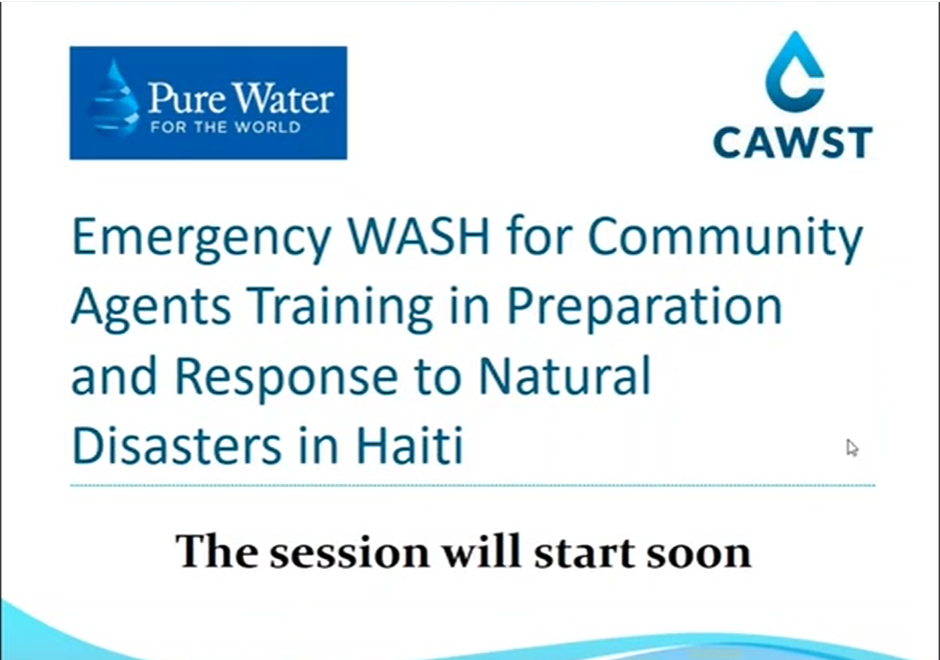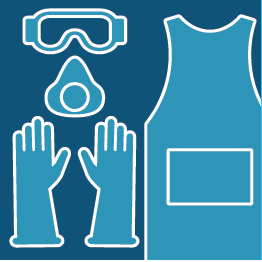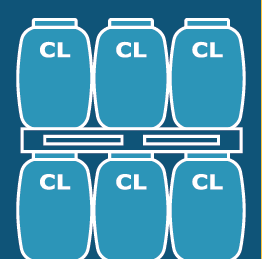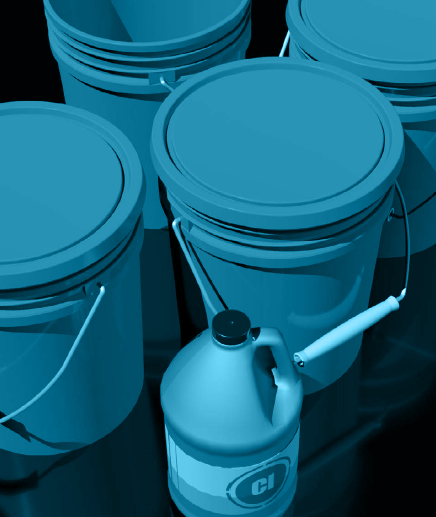Explorer WASH en situation d'urgence
Feuille de calcul de dose : Traitement au chlore des volumes d'eau de boisson
Utilisez cette feuille de calcul pour déterminer la quantité de chlore nécessaire pour préparer une solution de chlore à 1 % et la quantité de solution à 1 % nécessaire pour désinfecter un volume d'eau de boisson.
Langues
anglais
français
espagnol
arabe
portugais
Avant de désinfecter : Scénario de traitement au chlore de volumes
La turbidité, le pH et la température peuvent tous avoir un impact sur la rapidité et l'efficacité de la désinfection de l'eau de boisson avec des produits à base de chlore. Mettez en pratique la gestion d'un approvisionnement en eau dans un camp humanitaire ; sélectionnez et évaluez les tests requis pour l'eau et étudiez l'incidence de ces paramètres sur le dosage du chlore et le temps de contact.
Langues
anglais
français
espagnol
arabe
portugais
Collection Analyses de qualité de l’eau de boisson
Collection d'outils d'apprentissage pour aider les acteurs humanitaires et de développement à analyser la qualité de l'eau potable en conditions de terrain.
Langues
anglais
français
espagnol
arabe
portugais
Comment préparer une solution à base de chlore à 1 %
Suivez ce guide pour préparer une solution à base de chlore à 1 % qui peut être utilisée pour le test Horrock modifié et la désinfection de l'approvisionnement en eau.
Langues
anglais
arabe
français
espagnol
Utilisation du test Horrocks modifié pour calculer le dosage de chlore
Le test Horrocks modifié est une méthode permettant de calculer le dosage correct de chlore pour une quantité d'eau définie. Suivez Peter Thomson, directeur chez CAWST, pendant qu'il réalise le test Horrocks pour calculer le dosage correct du chlore pour un volume d'eau de boisson.
Langues
anglais
espagnol
français
arabe
Infographie sur le biofilm : Offrez-vous une bonne protection ?
Utilisez cette infographie pour sensibiliser le public à une menace invisible qui se cache dans les récipients d'eau de boisson, le biofilm. Ce poster explique ce qu'est le biofilm, la menace qu'il représente, les facteurs de risque avec sa formation et comment le combattre.
Langues
anglais
français
espagnol
arabe
hindi
Découvrez le traitement de l'eau à domicile
"Vous vous demandez comment approvisionner en eau potable les maisons, les écoles et les cliniques dans votre communauté ? La méthode de conservation et de traitement de l’eau à domicile (CTED) apporte une solution simple et efficace. Découvrez tous les fondamentaux pour démarrer ici."
Langues
anglais
espagnol
français
arabe
hindi
Wash'Em : Utilisation du logiciel
Dans ce module, vous apprendrez à parcourir le site Web Wash'Em et à utiliser le concepteur de programmes pour générer des recommandations de programme.
Langues
anglais
Wash'Em : Logistique
Ce module met en évidence les détails à prévoir avant de partir pour votre visite au sein de la communauté.
Langues
anglais
Wash'Em : Points de contact
Cet outil vous aide à identifier les canaux de communication, de sorte que vous pouvez ensuite classer par ordre de priorité les plus efficaces pour toucher la population concernée.
Langues
anglais
Wash'Em : Perception des maladies
L'outil Perception des maladies vous aide à comprendre comment les gens perçoivent la maladie qui vous occupe.
Langues
anglais
Wash'Em : Motivations
L'outil Motivations vous permet d'identifier ce qui conduit une personne à se laver les mains ou au contraire à ne pas le faire.
Langues
anglais
Wash'Em : Le contexte
Pour les humanitaires qui ne travaillent pas actuellement en situation de crise, ce module d'apprentissage en ligne vous fournit trois contextes réalistes de pratique.
Langues
anglais
WASH Behaviors and Disease Transmission - Lesson Plan (WASH-R Nepal)
The focus of this lesson is to highlight the connection between different WASH behaviors and the spread of disease. Participants will explore different ways water-related disease can be transmitted and the different ways of preventing this transmission within communities.
Langues
anglais
Choix de l'emplacement des latrines et accessibilité
Ce module vous guidera à travers les facteurs importants à prendre en compte pour choisir l'emplacement d'une latrine en se concentrant sur l'accessibilité du point de vue du vidangeur.
Langues
anglais
espagnol
français
arabe
Le défi du changement de comportement
Mettez-vous au défi de changer les comportements d'hygiène liés à la transmission du choléra dans ce scénario simulé.
Langues
anglais
espagnol
français
arabe
WASH in Schools (WiS Nepal) Workshop
This collection is intended to support people who facilitate WASH in School. It is based on the practical experience of the Environment and Public Health Organization (ENPHO) and the Centre for Affordable Water and Sanitation Technology (CAWST). It has been developed specifically for the context of Nepal.
Langues
anglais
Emergency WASH for Volunteers (E-WASH Nepal) Workshop
This collection is for trainers who are interested in delivering training on Emergency WASH for volunteers in the context of Nepal. It was developed following the 2015 earthquake in Nepal. It includes lesson plans, agendas, and guidance on training delivery.
Langues
anglais
WASH for Recovery (WASH-R Nepal) Workshop
This workshop is intended to support people who facilitate WASH awareness workshops. It is based on the practical experience of the Environment and Public Health Organization (ENPHO) and the Centre for Affordable Water and Sanitation Technology (CAWST). It has been developed specifically for the context of Nepal. The lessons are for WASH promoters and work well for participants with low levels of literacy. Each lesson comes with the materials needed or instructions on how to build the necessary materials.
Langues
anglais
Emergency WASH - Lesson Plan (WiS Nepal)
The lesson discusses on the minimum WASH requirement in school at the time of emergency along with listing the materials required for the stock piling in school for the reference during emergency period.
Langues
anglais
En savoir plus sur le traitement de l'eau potable dans les contextes d'urgence
Une collection de courts outils d'apprentissage en ligne et documents de travail pour aider les techniciens de l'eau à traiter, désinfecter et manipuler l'eau potable en toute sécurité dans des conditions de terrain.
Langues
anglais
français
espagnol
arabe
portugais
hindi
Apprendre sur le changement de comportement
Dans cette collection, vous trouverez des activités d'apprentissage en ligne et documents de travail qui vous aideront à intégrer le changement de comportement dans la conception des programmes WASH.
Langues
anglais
espagnol
français
arabe
En savoir plus sur l'assainissement dans les situations d'urgence
Une collection de courts outils d'apprentissage en ligne et de documents de travail pour conseiller les responsables de l'assainissement sur les méthodes de vidange, de transport et de traitement/d'élimination (gestion des boues de vidange) les plus appropriées dans les contextes humanitaires.
Langues
anglais
espagnol
français
arabe
Emergency Hygiene - Lesson Plan (E-WASH Nepal)
The focus of this lesson is to provide participants with critical information about hand washing and hygiene during emergencies to prevent the spread of disease.
Langues
anglais
Day 1 Closing - Lesson Plan (WASH-R Nepal)
This lesson plan contains a review for day one of the workshop.
Langues
anglais
Introduction - Lesson Plan (WASH-R Nepal)
The focus of the introduction is to create a safe learning environment and outline training goals and expectations. During the introduction participants meet each other and learn about the agenda over the next few days.
Langues
anglais
Coordinating for Support - Lesson Plan (E-WASH Nepal)
The focus of this lesson is to provide participants with information on organizations working in the disaster affected area, support these organizations are providing, and contact information to reach their services.
Langues
anglais
Water Quality and PoU Options - Lesson Plan (WASH-R Nepal)
The focus of this lesson is to explore the need for household water treatment after emergencies. Participants will explore different options for household water treatment and safe storage, and identify variables which affect effective HWTS implementation after emergency situations.
Langues
anglais
Working with People in Emergencies - Lesson Plan (E-WASH Nepal)
The focus of this lesson is to describe the current and ongoing goals of the emergency response effort, how an emergency WASH volunteer contributes to those efforts, as well as clarifies scope for the volunteer role. Participants will explore communication techniques for interacting with disaster-affected people so they are equipped with the tools they need while working in communities or in temporary relief sites.
Langues
anglais
Day 2 Opening - Lesson Plan (E-WASH Nepal)
This lesson plan contains a morning review from day one of the workshop. The review activities allow participants an opportunity to practice what they learned the day before.
Langues
anglais
WASH for Recovery Nepal Trainer Manual
This manual is for trainers who are interested in delivering training on WASH for Recovery in the context of Nepal. It was developed following the 2015 earthquake in Nepal. It includes lesson plans, agendas, and guidance on training delivery.
Langues
anglais
Day 2 Closing - Lesson Plan (WASH-R Nepal)
This is a lesson plan for the WASH for Recovery Nepal workshop about how to review the concepts covered in Day 2.
Langues
anglais
WASH in Recovery - Lesson Plan (WASH-R Nepal)
The focus of this lesson is to outline how emergencies affect infrastructure, people’s access to food, water, and safe WASH, as well as to highlight objectives for the emergency WASH recovery phase of activities.
Langues
anglais
Waste Management - Lesson Plan (WASH-R Nepal)
The focus of this lesson is to outline important considerations for waste management after emergency situations. Participants will discuss the increased importance of sanitation as disaster relief transitions to recovery, and explore strategies for the successful management of sanitation issues.
Langues
anglais
Coordinating for Recovery Activities - Lesson Plan (WASH-R Nepal)
The focus of this lesson is to provide participants with information on organizations working in areas that were affected by the disaster, the support these organizations are providing to ongoing recovery activities, and contact information to reach their services.
Langues
anglais
Practice Delivering Key Messages - Lesson Plan (E-WASH Nepal)
The focus of this lesson is to practice delivering key WASH messages during orientation at field level. In this session participant deliver at least one key message by using different IEC materials.
Langues
anglais
WASH in Emergencies - Lesson Plan (E-WASH Nepal)
The focus of this lesson is to outline how emergencies affect infrastructure, people’s access to food, water, and safe WASH, as well as to highlight the connection between emergencies and the increased risk of communicable disease in affected areas.
Langues
anglais
Emergency WASH for Volunteers Nepal Trainer Manual
This manual is for trainers who are interested in delivering training on Emergency WASH for volunteers in the context of Nepal. It was developed following the 2015 earthquake in Nepal. It includes lesson plans, agendas, and guidance on training delivery.
Langues
anglais
Water Quality in Emergencies - Lesson Plan (E-WASH Nepal)
The focus of this lesson is to explore the increased need for household water treatment in emergencies. Participants will practice the correct treatment of water using chlorine, and discuss how to teach people to treat and store their own water in emergency situations.
Langues
anglais
Day 2 Opening - Lesson Plan (WASH-R Nepal)
This lesson plan contains a morning review for day one of the workshop. The review activities allow participants an opportunity to practice what they learned the day before.
Langues
anglais
Key WASH Messages for Emergencies - Lesson Plan (E-WASH Nepal)
The focus of this lesson is to practice delivering key WASH messages during orientation at field level. In this session participant deliver at least one key message by using different IEC materials.
Langues
anglais
Hygiene - Lesson Plan (WASH-R Nepal)
The focus of this lesson is to provide participants with critical information about hand washing and hygiene during and after emergencies to reduce the transmission of disease. Participants will explore issues of personal, food, and menstrual hygiene and identify strategies for maintaining good hygienic practices.
Langues
anglais
Introduction - Lesson Plan (E-WASH Nepal)
The focus of the introduction is to create a safe learning environment and outline training goals and expectations. During the introduction participants meet each other and learn about the agenda for the day.
Langues
anglais
Emergency Sanitation - Lesson Plan (E-WASH Nepal)
The focus of this lesson is to outline the important considerations for excreta management and temporary latrine siting and construction during emergency situations. Participants will discuss the increased importance of sanitation during disasters and select appropriate technologies for temporary disaster relief.
Langues
anglais
Development and Delivery: Emergency WASH for Community Agents Training in Preparation and Response to Natural Disasters in Haiti
The presentation that will be delivered will speak about the WASH context in Haiti and how natural disasters have shaped Haiti’s access to safe water and sanitation. WASH Training and Consulting Services at Pure Water for the World in 2015 were able to co-develop an EWASH (Emergency WASH) training for CHPs during times of emergency. The presenter will speak about why emergency situations are different than other contexts and how this context presents difficulties in terms of delivering effective WASH solutions. The presentation will cover three recent natural disasters that struck Haiti (Earthquake 2010, Hurricane Mathew, Hurricane Irma) and how Pure Water for the World responded. The presentation will emphasize the impact that education can have after or before a disaster and how this differs from a direct on the ground response. The presentation will also cover why we chose to develop this training and what our goals were for the new workshop and how it is evolving. This presentation will mainly focus on our recent response to Hurricane Irma where we were able to deliver the workshop two times the week following the hurricane once in Port au Prince and then after in Cap Haitien where flooding and heavy rains were most prevalent. Facilitator: Andrew Scott Coco has been traveling to Haiti since 2011, where his mother was a medical volunteer after the 2010 earthquake. She eventually began working for Pure Water for the World shortly thereafter, while Andrew was studying Environmental Studies at the University of Vermont with a degree focus on Sustainability studies. Andrew has subsequently volunteered with Pure Water for the World during his school breaks and summer vacation since 2012. Over time, Scott found that all his course work and school focus were about Haiti: all the classes, papers, and degree track tied back into his ongoing experience in Haiti. He secured an internship with Pure Water for the World working in the Water Quality Testing laboratory in 2013.
Langues
anglais
Diarrheal Disease Response - Lesson Plan (WASH-R Nepal)
The focus of this lesson is to explore different diarrheal diseases present within communities and to identify ways of responding to them. Participants will discuss effective measures for responding to the presence of diarrheal disease and demonstrate how to effectively prepare oral rehydration solution in an emergency response context.
Langues
anglais
Disease Transmission and Blocking - Lesson Plan (E-WASH Nepal)
The focus of this lesson is for participants to discuss the connection between the environment and the spread of disease during emergencies. Participants will explore transmission routes of water-related diseases as well as ways to prevent these diseases from spreading in disaster affected areas.
Langues
anglais
Workshop Closing - Lesson Plan (E-WASH Nepal)
The focus of this lesson is to evaluate the information covered in the workshop and provide feedback on the training. Participants will also receive information on how to access additional support or training as an emergency WASH volunteer.
Langues
anglais
Inciter à l'utilisation des latrines – Plan de cours (WASH-R Népal)
L'objet de ce cours est de mettre en évidence les points importants liés à l'utilisation des latrines pendant et après des situations d'urgence. Les participants verront à quel point l'assainissement dans les opérations de secours est de plus en plus important en cas de catastrophe. Ils étudieront les stratégies appropriées pour gérer efficacement les questions d'assainissement.
Langues
anglais
Manipulez les produits à base de chlore avec précaution !
Suivez les directives affichées pour manipuler et utiliser en toute sécurité les produits à base de chlore. Cette affiche est facile à imprimer et à coller à l'endroit où les produits à base de chlore sont manipulés et rangés.
Langues
anglais
français
espagnol
arabe
Rangez les produits à base de chlore en toute sécurité !
Suivez les directives affichées pour ranger et transporter en toute sécurité les produits à base de chlore. Cette affiche est facile à imprimer et à coller à l'endroit où les produits à base de chlore sont manipulés et rangés.
Langues
anglais
espagnol
français
arabe
Calculez votre dose de chlore : Instructions pour le test Horrocks modifié
Ce guide donne des instructions pour réaliser le test Horrocks modifié. Ce test est utilisé pour déterminer la dose de chlore efficace pour le traitement au chlore d'un volume d'eau de boisson.
Langues
anglais
espagnol
français
arabe
Vérifiez la turbidité, le pH et la température avant de désinfecter l'eau de boisson avec du chlore
La turbidité, le pH et la température peuvent tous avoir un impact sur la rapidité et l'efficacité de la désinfection de l'eau de boisson avec des produits à base de chlore. Utilisez ce guide pour déterminer l'incidence de ces paramètres sur le dosage de chlore et le temps de contact.
Langues
anglais
arabe
français
espagnol
Learn about Wash'Em
The Wash’Em process involves using 5 rapid assessment tools to understand handwashing behaviours during a crisis. You then enter the findings into the Wash’Em software for tailored program recommendations.
Langues
anglais
À propos de CAWST
CAWST est une organisation caritative et une société d'ingénierie canadienne. Nous répondons au besoin mondial en eau potable et en assainissement en développant les connaissances et les compétences à un niveau local, afin que les personnes concernées puissent elles-mêmes mettre en œuvre des solutions à domicile.
